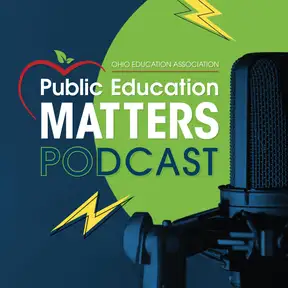Celebrating 40 years of legally protected collective bargaining in Ohio
2024 marks 40 years since Ohio's collective bargaining law took effect. Before that, public employees, including educators, could face jail time for going on strike, and the so-called professional agreements they had been able to negotiate with school districts didn't carry much weight. All of that changed with a stroke of Gov. Richard Celeste's pen in 1983, with the law taking effect the following year. OEA-Retired member Bill Lavezzi shares his memories of working in Ohio schools before and after the legal protections that were granted under Ohio's collective bargaining law.
SUBSCRIBE | Click here to subscribe to Public Education Matters on Apple Podcasts or click here to listen on Spotify so you don't miss a thing. You can also find Public Education Matters on many other platforms, including YouTube. Click here for links for other platforms so you can listen anywhere. And don't forget you can listen to all of the previous episodes anytime on your favorite podcast platform, or by clicking here.
Important Moments in Ohio's Collective Bargaining History:
SUBSCRIBE | Click here to subscribe to Public Education Matters on Apple Podcasts or click here to listen on Spotify so you don't miss a thing. You can also find Public Education Matters on many other platforms, including YouTube. Click here for links for other platforms so you can listen anywhere. And don't forget you can listen to all of the previous episodes anytime on your favorite podcast platform, or by clicking here.
Important Moments in Ohio's Collective Bargaining History:
- 1947 - Hagerman Decision
- Ohio Supreme Court case regarding dues checkoff
- Spoke in “strident terms” against public sector bargaining
- “[unions] have no function which they may discharge in connection with civil service employees"
- Deemed it was improper for a public entity to delegate authority to another entity (including a union)
- 1947 - Ferguson Act
- Banned public employee strikes and expressly allowed discipline, including termination, for participating in a strike
- 1958 - Voters reject a right-to-work amendment to the Ohio Constitution
- 1959 - The Ohio legislature authorizes union dues checkoff, which nullifies part of the Hagerman Decision
- 1975 reversal of the Hagerman Decision
- The Dayton Classroom Teachers Association won an Ohio Supreme Court case, which stated that a "board of education is vested with discretionary authority to negotiate and to enter into a collective bargaining agreement..."
- 1975 - Gov. James Rhodes vetoes the first public sector bargaining bill
- 1977 - Gov. James Rhodes vetoes the second public sector bargaining bill
- Between 1978 and 1980, there were 183 public sector strikes
- 1983 - Gov. Richard F. Celeste signs into the law the "Ohio Public Employee Collective Bargaining Act"
- April 1, 1984 - Ohio's collective bargaining law comes into effect
- 2010 - Senate Bill 5 would have eliminated nearly all collective bargaining rights for public sector employees
- On November 8, 2011, 61.33% of Ohio voters reject SB5 in a veto referendum
- 2018 - Janus v. AFSCME US Supreme Court decision eliminates agency fees
- **Information from OEA Collective Bargaining and Research Consultant Eric Watson-Urban.
Featured Public Education Matters guest:
- William Lavezzi, OEA-Retired member
- Retired English teacher Bill Lavezzi served as president of two OEA locals both before and after enactment of Ohio’s Collective Bargaining Law. While teaching, he served in a variety of leadership roles in OEA and the North Eastern Ohio Education Association. Upon retirement, he served as NEOEA’s executive director for sixteen years. Bill is a Professional Registered Parliamentarian and frequent presenter on parliamentary procedure. He is a retired delegate to the OEA Representative Assembly and a member of OEA’s Convention Planning Committee.
- When not in a meeting room, Bill is a pianist and cantor at several worship sites in Ohio and participates in local open mic nights, where he is expanding his repertoire of jazz classics and Cole Porter songs.
Connect with OEA:
- Email educationmatters@ohea.org with your feedback or ideas for future Public Education Matters topics
- Like OEA on Facebook
- Follow OEA on Twitter
- Follow OEA on Instagram
- Get the latest news and statements from OEA here
- Learn more about where OEA stands on the issues
- Keep up to date on the legislation affecting Ohio public schools and educators with OEA's Legislative Watch
About us:
- The Ohio Education Association represents nearly 120,000 teachers, faculty members and support professionals who work in Ohio’s schools, colleges, and universities to help improve public education and the lives of Ohio’s children. OEA members provide professional services to benefit students, schools, and the public in virtually every position needed to run Ohio’s schools.
- Public Education Matters host Katie Olmsted serves as Media Relations Consultant for the Ohio Education Association. She joined OEA in May 2020, after a ten-year career as an Emmy Award winning television reporter, anchor, and producer. Katie comes from a family of educators and is passionate about telling educators' stories and advocating for Ohio's students. She lives in Central Ohio with her husband and two young children.
This episode was recorded on September 23, 2024.

